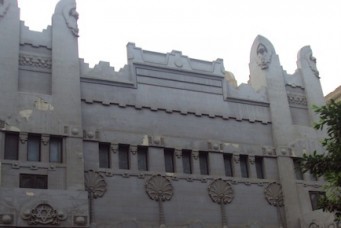Chahine Lives!
A cinema downtown pushes the boundaries of film in Egypt.
Ah, the Golden Age of Egyptian film. The 1940s, 1950s, and 1960s represented a glamorous period, producing cinematic icons such as Omar Sharif, Rushdi Abaza, and Naguib Al Rihani. It was also a time when Hollywood on the Nile constructed grand movie theaters to showcase its homegrown talent. The industry, the stars, and the movie theaters, too, have experienced declines over the years. But lately Cairenes have been queuing up at Cinema Odeon for a revival of sorts. The time-worn Art Deco cinema palace, down an alleyway now lined with ahwas, is the home of Zawya, Egypt’s first art house movie theater.
Zawya, roughly Arabic for “perspective,” is the brainchild of Misr International Films, the production and distribution company founded by the celebrated Egyptian filmmaker Youssef Chahine who died in 2008. The idea stemmed from Misr’s organizing of the annual Panorama of the European Cinema film festival, which began in 2004 as a way to break the monotony of the Hollywood blockbusters dominating Egypt’s modern movie theaters. The Panorama festival exposes local audiences to a selection of critically acclaimed feature films and documentaries, such as, most recently, 45 Years (United Kingdom), Far From the Madding Crowd (United States-United Kingdom), Je suis mort mais j’ai des amis (Belgium-France), and La niña de fuego (Spain-France). Since 2014, a young team led by director Youssef El-Shazli, and two graduates of the American University in Cairo, curator Alia Ayman (’10) and project coordinator Malak Makar (’14), have extended such offerings to delighted Egyptian film buffs throughout the year at Cinema Odeon. “In many countries you have two types of cinema: blockbuster and art house,” notes El-Shazli. “In Egypt we didn’t have the art house option for a long time—we want to show that there is another type of cinema that exists and has its own type of crowd.”
Zawya’s programming features bi-weekly premiers of theatrical releases. “Nothing too obscure or experimental,” says Makar, explaining that Zawya’s concept is to provide alternatives to cineplex fare while remaining inclusive at the same time. “I was initially concerned about the project being elitist,” Ayman adds. “We wanted to make it accessible.” Says El-Shazli: “We want to offer a diverse program finding a balance between films that are very art house and films that are semi-commercial and whatever lies between.”
Zawya has broadened its mission in unexpected ways. Working with Masreya Media, an audio production company specializing in subtitling, translation, and dubbing, it hosts film screenings for the blind that add audio descriptions of the visual events unfolding onscreen. Zawya recently brought homeless girls to Cinema Odeon to watch Wadjda, the award-winning film written and directed by Haifaa Al-Mansour (’97), and the first full-length feature film shot entirely in Saudi Arabia; the event was in collaboration with the Banati Foundation, a local organization that works with street children. “Film is an important tool for learning,” says Makar. “It’s a great way for discussing certain topics or issues outside of the classroom.” Zawya has also begun hosting events in movie theaters beyond Cairo; screenings have been held in Alexandria as well as the smaller cities of Tanta and Minya. The team launched Zawya Distribution six months ago, a mechanism to focus on Egyptian independent films by acquiring, releasing, and selling them.
Like all cinemas in Egypt, Zawya is compelled by law to clear its offerings with the government censorship authority, which results in some limitations, especially for productions that include nudity, indecent language, or political content. But for the Zawya team, a bigger challenge is how to become self-sustaining financially. Revenue is derived from ticket sales and a sponsorship from Commercial International Bank, but it is not enough to bring in all the films Zawya would like. “Sometimes it’s really expensive,” says Makar. “Subtitling, in particular, is very costly, and we don’t want to exclude large numbers of audience members because of language.” The solution, Makar believes, is for Zawya to own its own movie theater. Until then, the faded glory of Cinema Odeon will remain the venue for Zawya’s efforts to expand the boundaries of cinema in Egypt.


